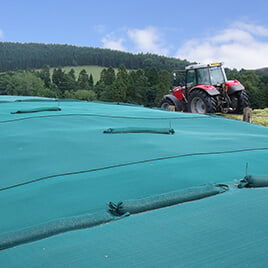In the ever-evolving world of agriculture, sustainability and innovation are key to securing a greener future. In the UK, recycled agricultural plastics are transformed into a variety of products, contributing to a circular economy and reducing environmental impact. At Agri.Cycle, we are passionate about turning agricultural waste into valuable resources. Here’s how different types of recycled agricultural material are typically processed:

Fertiliser Spray Cans
Recycling Process: These cans are often made from high-density polyethylene (HDPE) or other robust plastics. They are cleaned to remove any residual chemicals, shredded, and melted down. Recycled Products: The recycled plastic can be used to make new containers, piping, plastic lumber, and outdoor furniture.
Shotgun Cartridges
Recycling Process: Shotgun cartridges consist of plastic and metal components. The plastic (often polypropylene) is separated from the metal parts and processed. Recycled Products: The plastic can be repurposed into items like plastic pellets for industrial use, insulation materials, and even new plastic cartridges.
Feed/Fertiliser/Seed Bags
Recycling Process: These bags are usually made from woven polypropylene. They are cleaned, shredded, and melted. Recycled Products: The recycled material is used to produce new bags, plastic sheets, garden furniture, crates, boxes, and other industrial and consumer products.

Silage Wrap
Recycling Process: Silage wrap is typically made from low-density polyethylene (LDPE). After collection, the wrap is washed, shredded, and reprocessed. Recycled Products: Recycled silage wrap is used to create new silage wrap, refuse bags, construction films, and other plastic products.
Net Wrap
Recycling Process: Net wrap, often made from polyethylene, is cleaned and melted down into pellets. Recycled Products: These pellets can be used to manufacture various plastic products like new net wraps, fencing, and construction materials.
Crop Cover
Recycling Process: Crop covers are typically made from polyethylene or polypropylene. They are cleaned, shredded, and reprocessed. Recycled Products: The resulting recycled plastic can be used to create new agricultural films, bags, piping, and other industrial applications.
Benefits of Recycling Agricultural Plastics
Environmental Impact: Reducing plastic waste in the environment and minimizing the use of virgin plastics. Economic Advantages: Providing cost-effective raw materials for various industries. Sustainability: Promoting sustainable farming practices by integrating recycling into the agricultural lifecycle.
Promoting Recycling in Agriculture
To enhance the recycling rates of agricultural plastics, initiatives like the Green Tractor Scheme promote awareness and provide structured recycling programs. Collaborations with farmers, recycling companies, and governmental bodies ensure the efficient collection and processing of these materials.
This recycling effort not only helps manage waste but also supports the production of valuable new products, contributing to a more sustainable and environmentally friendly agricultural sector.
Join the Green Revolution with Agri.Cycle
By recycling these common agricultural waste materials, Agri.Cycle helps reduce the environmental impact of farming while creating valuable products that contribute to a sustainable future. Every piece of recycled agricultural material is a step toward a greener planet.
We invite you to join us in this green revolution. Whether you are a farmer, gardener, or environmentally conscious consumer, supporting recycled products from Agri.Cycle is a simple yet powerful way to make a difference.
Stay tuned for more updates and stories about our innovative recycling processes and the positive impact we are making on the environment. Together, we can build a sustainable future, one recycled agricultural material at a time.
For more information about our recycling programs and products, visit Agri.Cycle.

